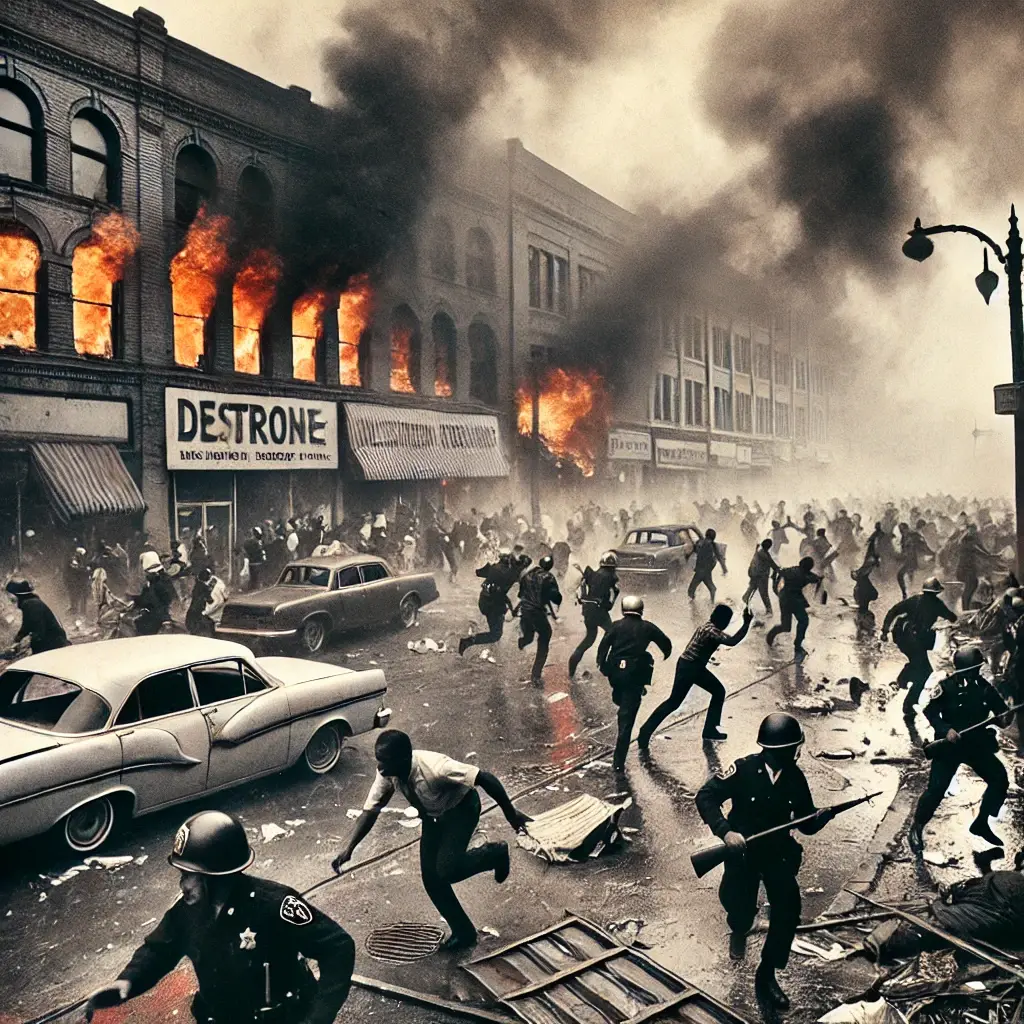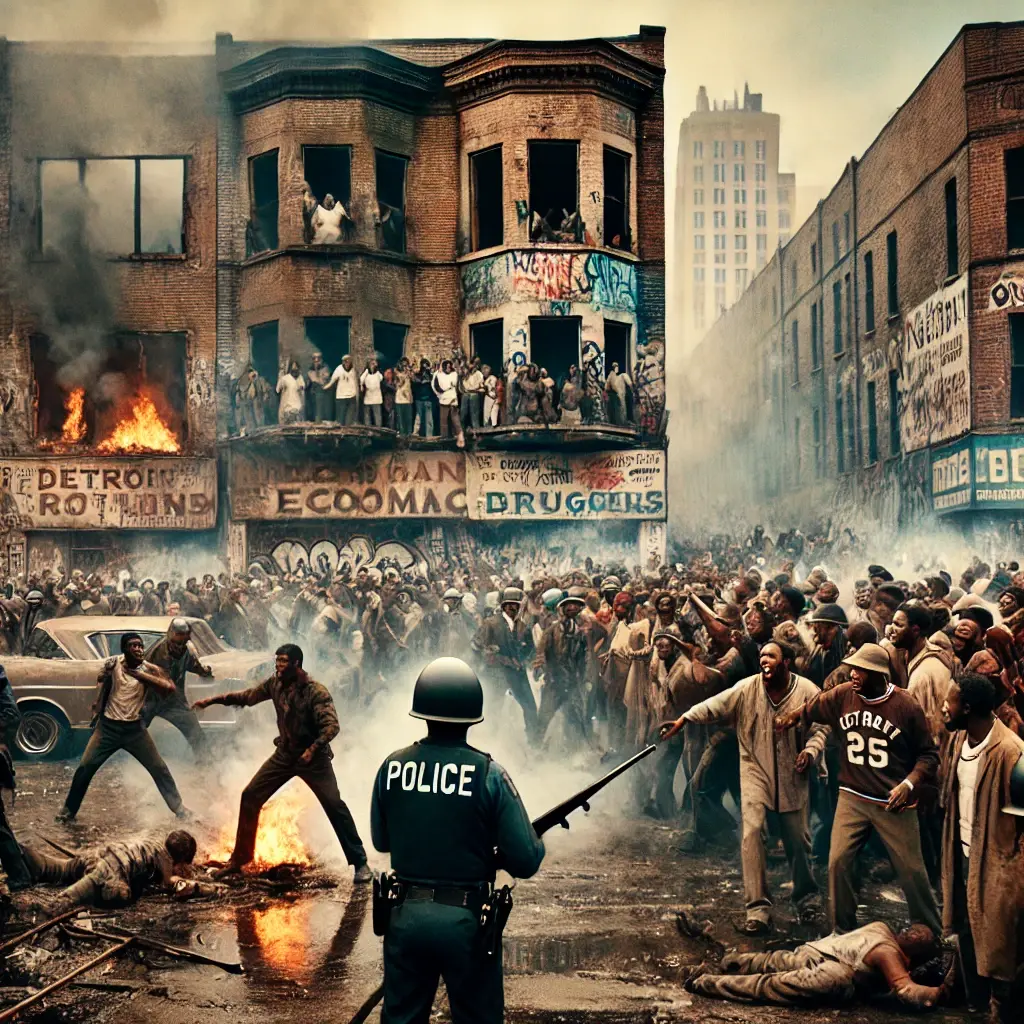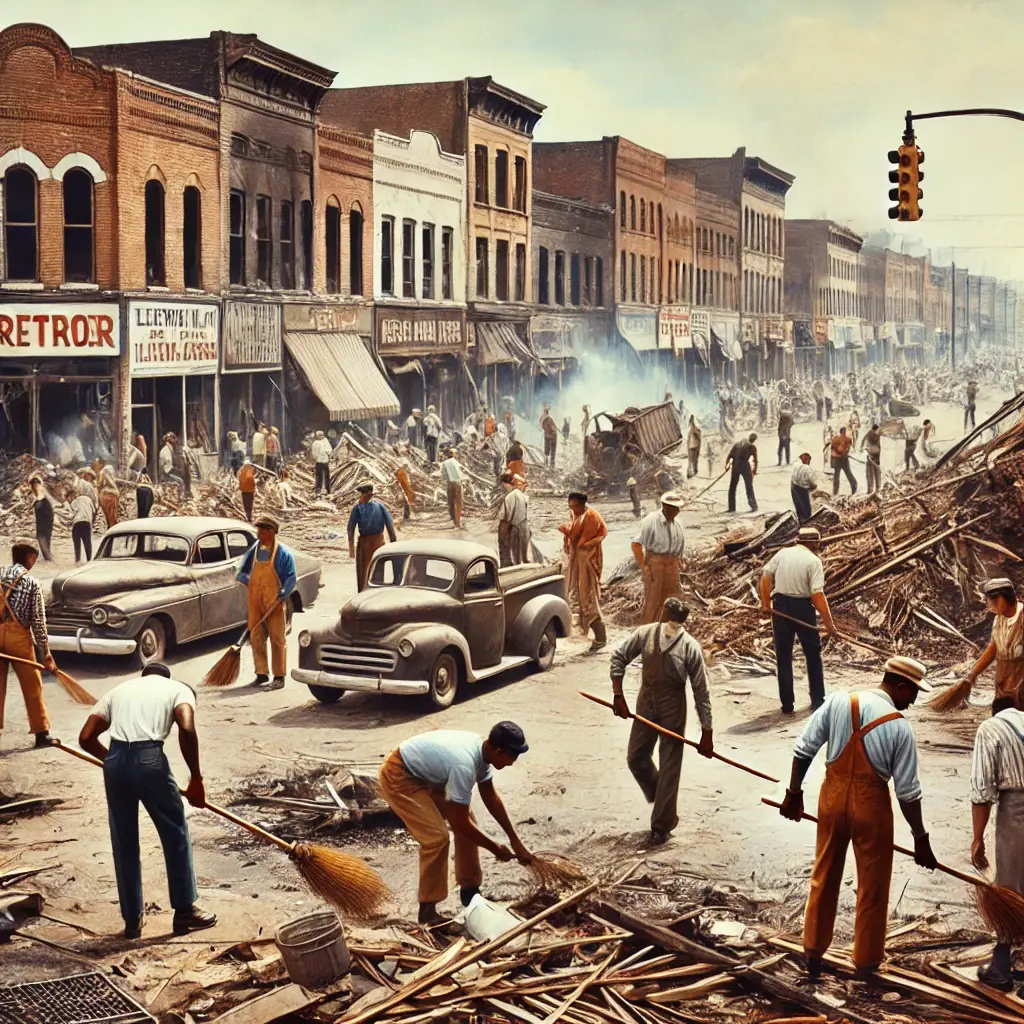The Detroit Riots began on July 23, 1967, after a police raid on an unlicensed bar, sparking five days of some of the most destructive riots in the history of the United States. The violence, looting, and arson resulted in 43 deaths and extensive property damage, highlighting deep-seated racial tensions and economic disparities in urban America. The riots prompted a national examination of race relations and urban policies, significantly influencing future civil rights advocacy and urban development strategies.

The incident that ignited the riots occurred in the early morning hours when Detroit police officers raided the Blind Pig, an unlicensed after-hours bar located at the intersection of 12th Street and Clairmount Avenue. The bar was hosting a celebration for two returning Vietnam War veterans, and approximately 82 people were inside at the time of the raid. As police attempted to arrest the patrons, a crowd gathered outside, and tensions quickly escalated.
What began as a localized confrontation soon spiraled out of control. By mid-morning, the situation had devolved into widespread looting and arson. The unrest spread rapidly across the city, particularly in predominantly African American neighborhoods. The response from law enforcement and city officials was initially slow and inadequate, allowing the chaos to grow unchecked.
As the violence continued to escalate, Michigan Governor George Romney called in the Michigan National Guard. Despite their presence, the riots raged on, and the scale of the destruction prompted President Lyndon B. Johnson to send in federal troops, including the 82nd and 101st Airborne Divisions, to help restore order. The deployment of federal troops underscored the severity of the situation and the inability of local and state forces to contain the unrest.
The Detroit Riots resulted in significant loss of life and widespread property damage. Forty-three people were killed, most of them African Americans, and over 1,000 were injured. Approximately 2,000 buildings were destroyed or damaged, and thousands of businesses were looted or burned. The economic impact was devastating, with many businesses choosing not to rebuild, leading to long-term economic decline in affected areas.
The root causes of the Detroit Riots were complex and multifaceted. Decades of systemic racism, segregation, and economic inequality had created a tinderbox of resentment and frustration among the city’s African American population. High unemployment rates, inadequate housing, and poor living conditions exacerbated the sense of disenfranchisement. Additionally, aggressive and discriminatory policing practices further strained relations between the African American community and law enforcement.
The riots served as a wake-up call to the nation, highlighting the urgent need to address racial inequality and improve conditions in urban areas. In response, President Johnson established the National Advisory Commission on Civil Disorders, commonly known as the Kerner Commission, to investigate the causes of the riots and recommend solutions. The commission’s report, released in 1968, famously concluded that “Our nation is moving toward two societies, one black, one white—separate and unequal.”
The Kerner Commission’s report called for sweeping reforms to address racial disparities and improve conditions in urban America. Recommendations included increased investment in education, job training, and housing, as well as measures to promote racial integration and reduce police brutality. While the report was widely praised for its thorough analysis and bold recommendations, its impact was limited by political resistance and insufficient funding.
In Detroit, the riots left a lasting legacy. The destruction of homes and businesses exacerbated the economic challenges faced by the city’s African American community. Many residents who could afford to leave moved to the suburbs, accelerating the process of white flight and further isolating inner-city neighborhoods. The economic and social fabric of Detroit was profoundly altered, with long-term consequences for the city’s development.

Despite the devastation, the riots also sparked renewed activism and efforts to address racial and economic injustices. Civil rights organizations, community groups, and local leaders mobilized to advocate for change. Programs aimed at improving economic opportunities, enhancing community relations, and promoting social justice were implemented, although progress was often slow and uneven.
The Detroit Riots also had a significant impact on policing practices and law enforcement policies. The widespread criticism of police conduct during the riots led to efforts to reform and professionalize police departments across the country. Community policing initiatives were introduced to build trust and improve relations between law enforcement and minority communities. However, challenges and tensions remained, and issues of police brutality and racial profiling continued to surface in the decades that followed.
The cultural impact of the Detroit Riots was profound. The events of July 1967 were depicted in numerous films, documentaries, books, and songs, reflecting the deep scars left on the city’s collective memory. The riots became a symbol of the broader struggles for civil rights and social justice in America, serving as a stark reminder of the consequences of racial inequality and systemic discrimination.
The legacy of the Detroit Riots continues to be felt today. The city has undergone significant changes in the decades since 1967, including efforts to revitalize and redevelop its urban core. While progress has been made, many challenges remain, and the issues highlighted by the riots—racial inequality, economic disparity, and social justice—continue to resonate.
In recent years, there has been a renewed focus on addressing the root causes of urban unrest and promoting inclusive development. Initiatives to improve education, create jobs, and provide affordable housing are seen as essential steps toward building a more equitable and just society. The lessons of the Detroit Riots serve as a reminder of the importance of addressing systemic issues and working towards lasting change.
The Detroit Riots also influenced the broader civil rights movement, highlighting the urgent need for federal action to protect and promote the rights of African Americans. The violence and destruction underscored the limitations of local and state efforts to address racial inequality and prompted calls for stronger federal intervention. This period of heightened activism and advocacy contributed to the passage of landmark legislation, including the Fair Housing Act of 1968.
The personal stories of those who lived through the Detroit Riots offer powerful insights into the human impact of the violence and destruction. Residents who witnessed the chaos and loss describe a sense of shock, fear, and sadness, as well as a determination to rebuild and create a better future. These narratives highlight the resilience and strength of the community in the face of adversity.
In educational settings, the Detroit Riots are studied as a pivotal moment in American history, illustrating the complexities of race relations and the challenges of achieving social justice. The events of July 1967 provide a lens through which students can explore broader themes of inequality, resistance, and reform, fostering a deeper understanding of the ongoing struggles for civil rights.
The Detroit Riots also serve as a case study for urban planners and policymakers, offering valuable lessons on the importance of addressing social and economic disparities in city development. The failures and successes of post-riot recovery efforts provide insights into effective strategies for promoting inclusive and sustainable urban growth.
The memorialization of the Detroit Riots, through public art, museums, and commemorative events, ensures that the history and lessons of this turbulent period are not forgotten. These efforts to preserve and honor the memory of the riots contribute to a broader understanding of the city’s past and its ongoing journey towards healing and reconciliation.

As Detroit continues to evolve, the legacy of the 1967 riots remains a powerful reminder of the importance of addressing systemic inequality and working towards a more just and equitable society. The city’s resilience and efforts to overcome its challenges offer hope and inspiration for communities facing similar struggles across the nation.
The Detroit Riots were a turning point in American history, highlighting the urgent need for social, economic, and political reform. The lessons learned from this period continue to inform contemporary discussions on race, justice, and equality, shaping the ongoing efforts to create a more inclusive and fair society for all.
